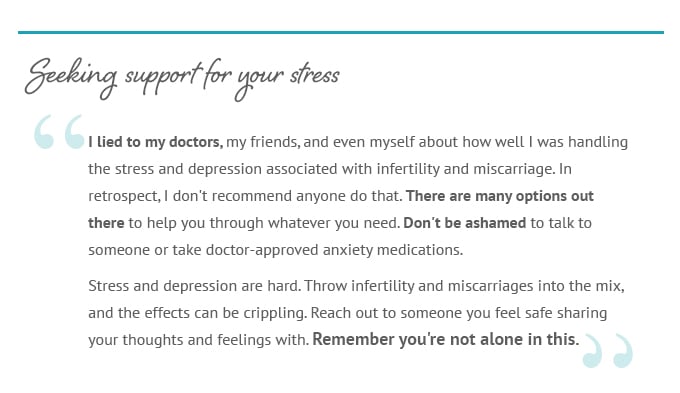
Medical contribution by Stephanie Beall, M.D., Ph.D. of Shady Grove Fertility’s Towson, MD office.
How honest are you with your doctor? With your partner? With yourself?
You probably wouldn’t mislead someone in a serious way…but a little white lie wouldn’t hurt, would it?
Well, it might.
When you’re working to uncover the cause(s) of infertility, both partners must be honest with each other and the doctor, otherwise, creating a path to pregnancy can be more difficult.
We turned to SGF’s Dr. Stephanie Beall to discuss the nine questions asked by a doctor that patients most commonly answer with white lies—and why telling the truth matters.
Are you guilty of fibbing (even just a little)?
1. How is your diet?
Both eating too much and eating too little can negatively impact your fertility. Body mass index (BMI) is a measure of our body fat and can be used to screen for weight categories that may lead to health problems. A BMI outside of the desired range has been tied to ovulation and pregnancy in women and sperm deficiencies in men. An excessively high or excessively low BMI can also reduce the effectiveness of fertility treatment.
“We understand that many of our patients aren’t intentionally dishonest about what and how much (or little) they eat. Instead, they’re simply unaware. To help develop an accurate idea about their diets, I commonly recommend patients keep a food diary or work with a structured weight-maintenance program,” advises Dr. Beall.
“Not only can you improve your overall health by monitoring and adjusting your diet, but you may also uncover an excessive intake of substances like added sugar, which could lead to fertility-impacting challenges, such as ovulatory dysfunction. Additionally, we can better determine if your weight gain is correlated to your diet (or lack of exercise) or if there’s a deeper underlying issue that needs to be addressed,” adds Dr. Beall.
2. How much do you exercise?
“Speaking of exercise, it’s common knowledge that there is a direct correlation between inactivity and weight gain, which negatively impacts fertility. But did you know that excessive exercise can also cause problems in both male and female fertility?” says Dr. Beall.
“In women, specifically, exercising in excess can cause an energy imbalance, which occurs when there is a difference between calories consumed and calories burned. An energy imbalance can create a state of physical stress, which, over time, may alter your hormones and ultimately prevent you from becoming pregnant,” Dr. Beall adds.
[WATCH: SGF’s Weight and Fertility On-Demand Webinar]
3. Do you smoke, or have you ever smoked?
“Smoking can have a negative impact on both an unborn child and, thanks to secondhand smoke, families as a whole. Many people aren’t aware, however, that smoking can also damage fertility for both men and women. Men and women who smoke take longer to conceive naturally and have lower success rates with treatments like IVF. Consequently, we require that families have a nonsmoking environment while under our care. Even if you’ve quit, a history of smoking remains an influencing factor in your fertility. You may think, ‘It’s been 12 full months since I had a cigarette. So, it doesn’t count.’ Unfortunately, when it comes to getting pregnant, it might,” reminds Dr. Beall.

More and more people are turning to alternative remedies like marijuana and CBD oils to alleviate pain, stress, anxiety, insomnia, and inflammation, but how could this be affecting your fertility?
“The data on marijuana and fertility is inconclusive. However, some studies do show a negative impact on gamete quality and negative effects on neurosignalling that could impact neurodevelopment of the fetus,” says Dr. Beall.
4. Do you drink alcohol?
Of surveyed Americans, more than half report drinking alcohol within the last month.
So, if you’re a social drinker, you’re not alone.
While consuming alcohol won’t necessarily make it harder for you to conceive, there is evidence to suggest that drinking—particularly in excess—could make conception more difficult. Alcoholism can result in hormonal imbalances, which in women, can hinder regular ovulation and in men can result in reduced sperm count and erectile dysfunction.
Dr. Beall reminds, “Put simply, alcohol creates a slew of challenges in your efforts to conceive as well as in your ability to receive fertility treatment. For these reasons, we urge you to realistically account for your alcohol consumption and be honest when you share that information with your doctor.”
5. Have you ever had a sexually transmitted infection?
It’s a conversation no one likes to have, but it’s critical to inform your doctor about any sexually transmitted infections (STIs), even those that are treatable or have been cured.
While your doctor needs to know about STI history in either partner, this information is particularly important if the female partner has had gonorrhea or chlamydia. These STIs can result in Fallopian tube damage, which could make conception more difficult.
“The faster we can identify any such damage, the sooner we can work together to address it,” says Dr. Beall.
6. Have you conceived before?
If you—or your partner—have conceived in the past, it indicates that you have (or have had) reproductive potential. Your doctor needs to know this.
“For women, it’s essential for us to know about any previous pregnancies and their outcomes. This includes any problems encountered during the pregnancy, how you delivered, or if you terminated the pregnancy. Prior pregnancies can have a definite impact on your future pregnancies,” says Dr. Beall.
7. Have you had your tubes tied—or has your partner had a vasectomy?
Even though you were in a different place when you decided to have your tubes tied—or perhaps you were with a different partner when you had a vasectomy—it’s still critical that you’re forthcoming about these procedures with your current partner and doctor.
“It’s best that your partner hears these revelations from you prior to your treatment,” adds Dr. Beall.
8. How long have you been trying?
Many couples aren’t clear on the difference between “trying to conceive” (TTC) and “having unprotected intercourse.
“By only telling us how long you’ve been using ovulation predictor kits, timing intercourse, or otherwise monitoring your fertility, you’re not giving a true picture of how long you’ve been trying to start or grow your family. Instead, share how long you’ve been having intercourse without protection—that’s the information we, as physicians, are really looking for in order to best treat you,” reminds Dr. Beall.
9. Are you experiencing stress?

Dealing with infertility can be quite stressful. While failing to acknowledge or otherwise deal with your stress won’t likely impact the severity of your infertility, it’s not helpful to keep your feelings bottled up inside. Not only will trying to handle this stress without support be emotionally difficult, it could also impact your physical health and your relationships. Some people elect to engage in unhealthy behaviors —like failing to exercise or eating the wrong foods—in periods of extreme stress.
“It’s not uncommon for a woman (or man) facing infertility to hide from her doctors, her partner, her friends or even herself about the amount of stress she is experiencing. Infertility-related stress isn’t an inevitability. We encourage our patients to work with us to identify ways you can actively reduce anxiety and stress,” says Dr. Beall.
10. Supplements and Alternative Medicine
Many couples struggling with infertility have chosen alternative approaches in an attempt to boost their fertility. Complementary approaches include acupuncture, herbal supplements, meditation and massage. Scientific research on these therapies is currently underway. While some approaches may be beneficial, others may not. Therefore, it is important to discuss everything you are trying or have tried in the past. We work closely with practitioners of complementary and holistic approaches at our Wellness Center. Learn about our Wellness Center and the services that are available at select offices.
If you are struggling to conceive, it might be time to see a fertility specialist. Please call our New Patient Center at 1-877-971-7755 to schedule an appointment or complete this simple form.
Editor’s Note: This blog post was originally published in March 2017, but was reviewed and updated for accuracy in August 2019.




